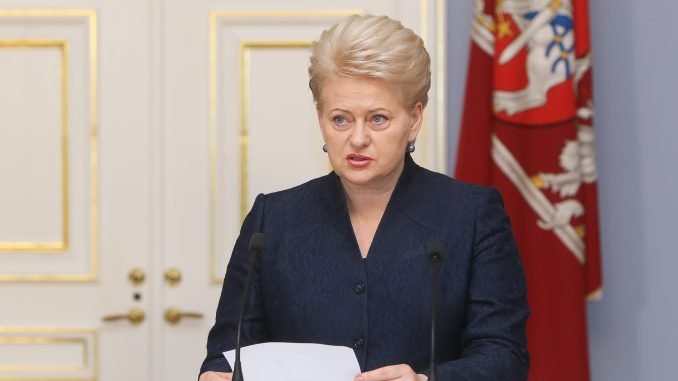
President Dalia Grybauskaitė read her final annual address a few weeks ago. This was the concluding speech of two terms, thus it was natural to expect that the head of state will summarise her work, will say what Lithuania managed to achieve and what was not successful, also to look at the future, lrytas.lt writes in its editorial.
Those, who hoped that the president’s final speech will feature an open look at her policies were left disappointed – not even a glimpse of this could be found.
There was also none of a more emotional dialogue with the nation, which handed D. Grybauskaitė the keys to the state for a decade, only in her concluding words did she thank the Lithuanian people for their trust, but her emotionless speech came across as exceptionally dry.
That said, in this address, we can see certain aspects of a political testament. But what the president’s wishes were for her successor G. Nausėda is primarily a reflection of her complicated relations with various branches of government.
Warning to Nausėda
She warned her successor that certain politicians dream of a silent, yes-man sort of president, who proves to be no obstruction and in the name of the people, she called for a head of state that defends the people’s interests and both constitutional and human values.
But was D. Grybauskaitė herself such a leader? For a decade, she sought to prove that she has a specific understanding of defending the people’s interests – she sought superiority for herself, demeaning other politicians and even manipulating law enforcement reports, constantly preaching to majorities and criticising cabinets.
Furthermore, the president urged the future head of state to make no changes to her foreign policies, not cease the militant rhetoric regarding Russia that she was known for.
The head of state seemingly marvelled at herself, stating that foreign policy based on neither fear nor subservience is what earns respect for Lithuania and that this will always prove more justified than efforts to pander. She raised herself to global political heights, stating, “The world now knows – you cannot push Lithuania around.” In other terms, you can’t push D. Grybauskaitė around.
Right at this point, an angry tirade is poured on Prime Minister S. Skvernelis for his musings that Lithuania should support dialogue with Russia in questions of importance to our country and his genuinely naïve sounding proposal to Minsk of his so-called “cunning plan” regarding Astravyets Nuclear Power Plant.
“Immature political decisions and declaration on cooperation with hostile states can become crawling threats, which will make use hostage when we must choose between bad and dangerous,” the president chided.
On relations with neighbours
Nevertheless, the more laughable than serious proposals of S. Skvernelis to Minsk were just election rhetoric, which posed no threat to Lithuania and his thoughts on maintaining political links with Moscow may be dubious, but unlikely to really deserve scorn when, for example, Estonian President K. Kaljulaid recently met with V. Putin. And the sky didn’t fall.
Thus, the question arises, why should the president, summarising a decade of politics, emphasise one-time statements by the prime minister?
Overall, it is odd that despite mentioning Russia a number of times, the president said nothing about Lithuania’s particularly important strategic Partner, Poland, while it was namely S. Skvernelis’ initiatives that somewhat thawed the ice in bilateral relations that emerged when D. Grybauskaitė replaced V. Adamkus as president.
The president’s speech also had little mention of our Baltic neighbours. While our countries are tied by numerous security, political and economic links, for the past decade it was felt that there is a lack of earnest interaction both on the bilateral and trilateral levels.
Furthermore, D. Grybauskaitė even managed to insult Latvia by not visiting to congratulate the Latvians for their statehood centenary.
Instead, the president, as if embodying Lithuania, made abstract praise of herself that our country is forming the European agenda because it has things to offer for the future of Europe.
Energy independence
The head of state particularly emphasised Lithuania’s success in seeking energy independence, strengthening cybersecurity. These are real achievements, but when listening to the president’s speech, it seemed that she takes all the credit despite energy projects have been primarily the domain of the cabinet.
Meanwhile, criticism for both the cabinet and the ruling coalition, only perhaps masked by hints, was plentiful in this annual address as well.
It is a paradox – the president’s criticism of the ruling coalition sometimes is more fitting for her herself. This was cunningly grasped by “Farmer” leader R. Karbauskis, who ironized that the head of state’s’ speech contained much self-criticism and illustrated this through her statements regarding law enforcement.
By stating that “there have been numerous attempts to involve law enforcement into political processes – employ it in electoral fights or waring with opponents,” D. Grybauskaitė seemingly shoots herself in the leg. After all, she alone constantly manipulated all sorts of law enforcement reports in the name of political settling of accounts.
President-Elect G. Nausėda found his predecessor’s address most lacking in attention to social issues. He is completely correct – it cannot fail to surprise that D. Grybauskaitė did not say a word about either the massive threats of emigration nor about poverty even though it would seemingly take deafness to not hear, what matters the most to the Lithuanian people.
But perhaps it wasn’t even worth expecting any more from this president than just self-praise, grand-standing, and criticism toward others?


Be the first to comment